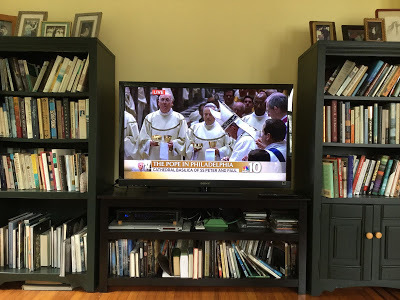Beth Kephart's Blog, page 38
September 27, 2015
how to measure our love, from the Pope
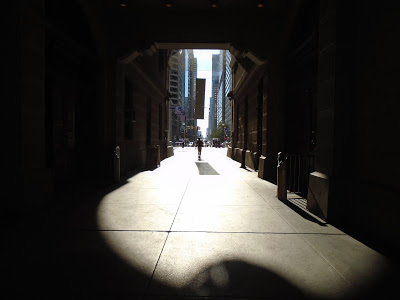
"I’ll leave for you a question so that each one may respond to it. In my house do people yell? Or do you speak with love and affection? This is a good way to measure our love."
— Pope Francis
Goodbye, beloved man of humility and wisdom. You have taught the power of silence over boast, prayer over demand.
Thank you, Philadelphia and all who gathered here.




Published on September 27, 2015 16:29
pushing narrative boundaries at the BankStreet Fest, with Tim Wynne-Jones and Daniel Jose Older
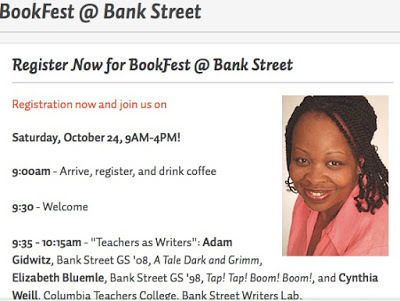 A few months ago I received an invitation from one of my very favorite people in all of young people's literature, Jennifer Brown. If our friendship has evolved over time, my respect for Jenny was immediate. As a Shelf Awareness reviewer, prize adjudicator, discussion leader, Bank Street visionary, and all-around children's books advocate, Jenny's opinions have mattered. She has welded intelligence with kindness and become a force. Today she serves as vice president and publisher of Knopf Books for Young Readers at Random House Children's Books—a position that is such a perfect fit for her myriad talents (and soul) that one imagines it was waiting for her all along.
A few months ago I received an invitation from one of my very favorite people in all of young people's literature, Jennifer Brown. If our friendship has evolved over time, my respect for Jenny was immediate. As a Shelf Awareness reviewer, prize adjudicator, discussion leader, Bank Street visionary, and all-around children's books advocate, Jenny's opinions have mattered. She has welded intelligence with kindness and become a force. Today she serves as vice president and publisher of Knopf Books for Young Readers at Random House Children's Books—a position that is such a perfect fit for her myriad talents (and soul) that one imagines it was waiting for her all along.Before Jenny took on that new role, she designed the 2015 BookFest@Bank Street and extended the invitation I noted above. Featuring Rita Williams-Garcia in a keynote, the day will include insights from scholars and writers Leonard S. Marcus, Adam Gidwitz, Elizabeth Bluemle, Cynthia Weill, Christopher Myers, Shadra Strickland, Raul Colon, Sara Varon, Joe Rogers, Jr., Laura Amy Schlitz, Jeanne Birdsall, Kat Yeh, Liz Kessler, and Monica Edinger. BookFest will also feature a panel titled "Pushing Narrative Boundaries in Teen Literature," moderated by the reliably smart and provocative Vicky Smith, the reviews editor of Kirkus.
I'm thrilled to be joining Tim Wynne-Jones and Daniel Jose Older on that boundaries-pushing panel. I was thrilled even before I'd read their new novels, The Emperor of Any Place and Shadowshaper, respectively. But now, having spent the last few days immersed in both, I'm even more eager. This will be a conversation. The kind of conversation that I crave like I crave a perfect peach or a ripe Bartlett pear.
The Emperor of Any Place is a work of supreme art. A nested story within a story (and, one might suggest, within another story) that carries the reader in and out of history. There's the present-day reality of a teen named Evan who has lost his father and must now endure (within the knot of his grief) the arrival of his once-estranged grandfather. There is, as well, the story inside the book Evan's father was reading when he died—the diary of a Japanese soldier stranded on a small Pacific island during World War II. The soldier is not the sole inhabitant of that island, nor is he the only one who ultimately writes inside those diary pages. As Evan reads the book, many mysteries emerge. Why was his father obsessed with this story? Why is his grandfather obsessed, too? And what is the truth inside these diary pages that were annotated, later on, by another visitor to that island?
Emperor is grounded in the fear of war and the haze of solitude and the ingenuity of survivors, both contemporary and historic. It is wholly conceived and executed, yet it trembles with mystery and a touch of magic. It is brilliantly structured but its power does not rest on its conceit. Tim may have pushed the narrative boundaries but he has not taken a single short cut, not expected the readers to follow just because he's feverently hoped they will. Every element adds to every element here. There are rewards for those who ponder, and, indeed, you could ponder all day and never find a fault line in this complex novel's execution.
Shadowshaper casts its own marvelous spell, builds its own mystique, is the sort of original work you would expect from an author who is also a musician who is also an EMT who is also a commentator on social order and disorder. Daniel has built a book about a young girl who discovers within herself a legacy power—and who must learn to harness it for a greater good. Sierra Santiago is a painter who can see, within the art of others, shadow lives and shapes, art that fades, murals that shed real tears. She is a daughter and a granddaughter in pursuit of hidden grace. She chases, and she is being chased. She rises to the challenge.
Sierra does all this within language steeped in salsa rhythms and Brooklyn gaits. She does this while pondering the color of her skin, the explosive nature of her hair, the discrete borders inside the border lands of race. Daniel is not just weaving a magical story here. He is telling his readers something about how it feels to live today within the fractures of society. About how it is to hope, despite the noise of now.
Authors of books that break the rules must know, to begin with, what the prevailing rules have been. They have a special obligation to steer their projects toward a higher grace, so that the strange ultimately does collide with a deep emotional truth, so that the fiction feels real, so that the experience of reading the story goes beyond admiration and straight into embrace. Fiction comes from a human place. The best fiction elevates the idea of the humane.
We'll talk about this and much more, I'm sure, at Book Fest. I'll learn; I'm sure of that, too.
Registration information for Book Fest is here.




Published on September 27, 2015 06:26
one single man. one world. the Pope in Philadelphia.
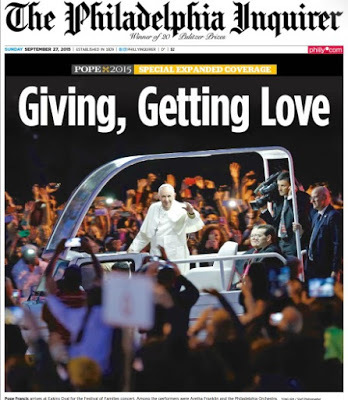
One single man unites three cities, also the world. He wears white. He raises his hand. He stops his Fiat to kiss a young boy on a head, to touch a baby, to nod at an Argentine flag, to laugh at something, to mime a quick sprint. He speaks, at a mass, of St. Katherine. He honors educators and peacemakers. He talks about the power of being individually different together and about the devastations of attempting global sameness.
Celebrate your history.
Celebrate your culture.
Celebrate our many languages.
He celebrates the immigrant, reminds those who must be reminded that we, here in America, we, here, in Philadelphia, are all products of movement; my own Italian great-grandfather became a naturalized citizen not even 100 years ago. He asks us to look past walls and barriers. To be honest with each other. To seek out peace, to stop perpetuating damage, to hold together family and family life.
Money, fame, celebrity, awards, job titles: These things do not impress him. He prefers his own shoes, his own small apartment, his single suitcase of possessions.
We are watching him, learning from him, studying the skies (the morning hue here is the brightest pink). We are celebrating with those, like Sister Kimberly Miller, who have stood in his presence. We are praying for him today, another long day, and we will be praying for him, as his plane departs tonight, and then after, when he has more meetings to attend to, another continent to greet and to inspire.
Make the peace, he says. Or keep it.
Be honest.




Published on September 27, 2015 03:53
September 26, 2015
Our Pope in Our City
Published on September 26, 2015 08:29
September 25, 2015
The plush Pope reads about Truth. A gift from Starla J. King
Published on September 25, 2015 09:12
September 24, 2015
Sunday Pasta (on Wednesday Night): With Edwin Garrubbo (and Dave Roberts) at Valley Forge Barn
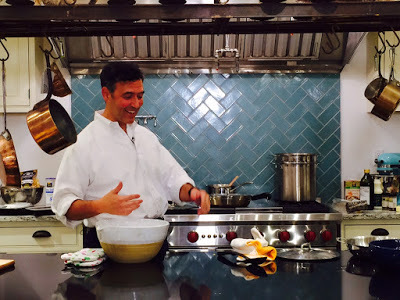
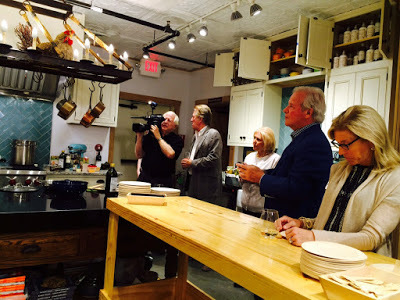
Several weeks ago, in an act of uncalculated whim, my husband bought two places at the table of Edwin Garrubbo, an Italian pasta master who had agreed to bring his art to the Valley Forge Barn in Wayne, PA. The Barn has become a fixture in our lives. The place where I buy my favorite gifts and meet my friend Kelly for our tradition of non-tea (okay, so, I have the tea and she has the gelato). The place that can be counted on for the unexpected pumpkin wreathe, leather from Australia, lessons in planting, flowers to carry home. Art and plenty of room overhead. Cookbooks I buy and actually cook from.
Last night was the Ed Garrubbo night. As I dressed for the event, straightened my hair, put on real shoes, I had no idea what to expect. Only that I was going to leave my worries behind for a spell and step out among lovers of pasta.
We were at ease from the moment we opened the door and entered in. Some sixteen expectant diners, the Barn staff, Ed, and eventually his wife and children, became our friends for the evening. Among those gathered there were Dave Roberts, the acclaimed ABC weatherman, and his stunning wife Patti. I'd watched Dave report the storms and sun for many years. He had projected grace through the TV lens. That grace wasn't, I can tell you, an act.
And so we watched Ed cook. And we ate three of his pasta dishes. And we learned about Italy, olive oil, proportions of salt, favorite restaurants. We talked about the Pope, ribbons of intention, living here and living elsewhere, Italian Christmas traditions. We finished with gelato.
An evening to remember with gracious hosts and guests. We came home with Ed's cookbook, Sunday Pasta, and a link to his popular cooking blog.




Published on September 24, 2015 04:44
September 21, 2015
taking HANDLING (and memoirs I've loved) to Moravian Academy in Bethlehem, PA
 In an hour I'll set out for Bethlehem, PA, where I'll spend the day at Moravian Academy, a high school that has dedicated much of this year to stories of self and memory and that selected
Handling the Truth
as its all-school read as part of the process.
In an hour I'll set out for Bethlehem, PA, where I'll spend the day at Moravian Academy, a high school that has dedicated much of this year to stories of self and memory and that selected
Handling the Truth
as its all-school read as part of the process.Moravian also invited students and faculty to read three memoirs I recommended—The Answer to The Riddle is Me (David Stuart MacLean), Brown Girl Dreaming (Jacqueline Woodson), and Gabriel (Edward Hirsch).
We'll begin with an all-school assembly and a conversation about non-traditional forms. I'll then travel to two sophomore-level classrooms to workshop emerging student ideas and to talk more deeply about the making of truth.
A day I have anticipated happily for several months now is about to begin.




Published on September 21, 2015 03:42
September 20, 2015
signing LOVE for Pope Francis
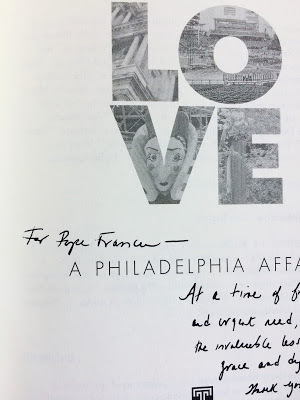 "For Pope Francis," I write.
"For Pope Francis," I write.And pause.
A friend has written with unexpected news. A copy of Love will be slipped into the Pope's hands. A dedicated copy.
I trembled. Then wrote on.




Published on September 20, 2015 12:27
September 19, 2015
back to school night, at Penn, with Julia Bloch
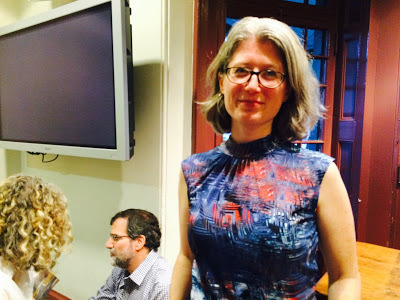 I had a summer that didn't use much of my mind, so then I lost words. And my body, too, began to dwindle, only I gained weight in the process.
I had a summer that didn't use much of my mind, so then I lost words. And my body, too, began to dwindle, only I gained weight in the process.So when Jessica Lowenthal invited me to the reception honoring Julia Bloch, the new director of Creative Writing at Penn, I had many concerns. One: my wrong hair. Two: my wrong shoes. Also (like I told Jay Kirk and then Greg Djanikian and maybe even Tom Devaney and Avery Rome and Stephen Fried, but not my students Nina and David, or maybe I did, because I don't know, I was feeling irresponsible, and did I tell Al Filreis, too?, but I know I did not so burden Jamie-Lee Josselyn, Lorene Carey, Max or Sam Apple, at least I hope not), I had lost my personality. Left it somewhere. In the summer.
(Perhaps that's a good thing?)
But I went anyway, talking to my son by phone while in transit so that I would not turn back because, as I have noted, everything about me was not quite right, and if I'd not been talking with him, I'd have talked myself back onto the train and headed reverse west, for home.
Then I crossed the threshold at Kelly Writers House (there's always a little thrill involved) and everything changed. The place was just, well, filling up. With faculty members I respect and love, and students I adore. Soon (or, it actually happened first) Jessica herself was taking me on a tour of the new Wexler studio, and bam. I didn't look right, but something happened. I felt as if I belonged.
Then the star of our evening, the star of our program, stepped forward and faced a crowded, beaming room and began to read poems from Valley Fever (Sidebrow Books) and Hollywood Forever (Little Red Leaves Journal & Press, the Textile Series) and I, sitting there in the front row, began to feel a hot little prickle inside my head. Like the blank nothing of my thoughts was getting Braille-machine punched by all the delicious oddness of Julia's phrasing and syntax, occasionally repurposed lines, jokes I got and maybe didn't always entirely get (because, as I always say and forever mean, I am just not that smart). Julia was talking and then (I heard this) she was singing, but without any change in the pitch of her voice. Singing by exuding whole phrases in one long breath, then stopping (beat/beat) and starting again. It was like being driven in a car with the windows down, at night, when there is a lot of open road but also some bright red traffic lights.
Damn, I thought.
What do I mean, how can I explain this? These coupled and uncoupled ideas, the surreality of words you assume have been fashioned from parts, the winnowed down ideas that, when toppled and stacked, say something. Mean something. Even if you can't actually always articulate what you have been stung by, you know you have been stung.
Here is half of "Wolverine," from Valley Fever, a poem I instinctively love, also a poem I will ponder for quite some time.
Wolverine
This afternoon, following a morning of work and a conversation with a friend, I read Julia's two books through, cover to cover. I hovered. I felt that warm thing happen again in my head, that invitation I will, as a writer and reader, always accept—to slam and scram the words around, to make the heart inside the brain beat again.
I was only pretending
to be epiphanic
she said, tossing the whole
day over the embankment.
Is the heart collandered
or semiprecious
filled with holes
and therefore filled with light —
....
Thank you, Julia, for making my brain heart beat again.
And. You are going to be terrific. You already are.




Published on September 19, 2015 14:12
The Prize/Jill Bialosky in the New York Journal of Books
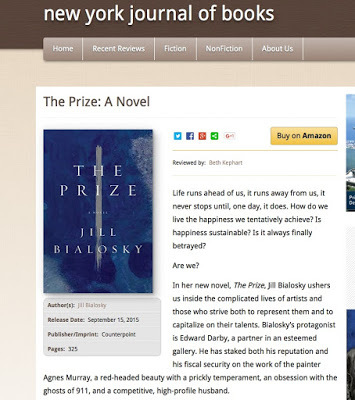 In the midst of crazy, swoony days, I sat down with Jill Bialosky's new novel The Prize, a book I kept racing to return to, because you just know, from about page one, that you won't rest until you know what happened.
In the midst of crazy, swoony days, I sat down with Jill Bialosky's new novel The Prize, a book I kept racing to return to, because you just know, from about page one, that you won't rest until you know what happened.Art. Greed. Honor. Desire.
It's all here.
My thoughts, in the New York Journal of Books .




Published on September 19, 2015 04:42

